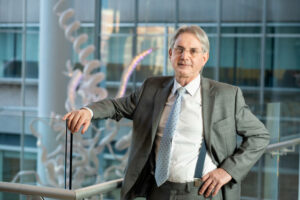
Dr. Jonathan A. Epstein is the new interim dean of the Perelman School of Medicine at the University of Pennsylvania and the executive vice president of the University of Pennsylvania for the Health System.
That puts him in charge of Penn Medicine, “an $11.9 billion enterprise dedicated to excellence in the related missions of medical education, biomedical research and patient care,” according to upenn.edu. The Perelman School has more than 3,000 faculty members, more than 4,500 students, trainees, residents and fellows, and over $1 billion in “total sponsored research.”
It’s a big job. But Epstein, according to his upenn.edu profile, is qualified for it.
The Jewish physician started at Penn in 1996.
“He is widely recognized for contributions to the understanding of congenital heart disease, heart failure, stem cell biology and epigenetics,” the profile states.
“His most recent advances involve utilizing modified mRNA delivered with targeted lipid nanoparticles to engineer immune cells within the body to fight heart disease, cancer and other disorders,” it continues.
Epstein was appointed as dean on Dec. 12. He emailed with the Jewish Exponent about why he wanted the job, what it means to get it and where he wants to take the school from here.
Why did you want this job?
I am honored to take on the role of interim executive vice president of the University of Pennsylvania for the Health System and dean of Penn’s Perelman School of Medicine as Dr. Larry Jameson moved to become Penn’s Interim president. I began my career at Penn in 1996. I am a cardiologist and stem cell biologist and, for the last eight years, I have served as the chief scientific officer of Penn Medicine, overseeing research and research training. I love this institution, the people who make this a wonderful community, and am so proud of the growing impact of our research, discovery and clinical care on people near and far.
Some of the most exciting things happening in medicine today are taking place at Penn, with Philadelphia as an epicenter of emerging fields like cell and gene therapies. The pace of progress is astonishing, and I am inspired by my colleagues who are working on research that is truly changing the world, saving and improving lives in ways that were unthinkable just a few years ago. Now, we can cure patients’ cancer by reprogramming their own immune cells to attack their tumors, and we are working on ways to use mRNA, the same technology platform that made COVID-19 vaccines possible, to both prevent and cure many types of diseases. It’s both thrilling and humbling to have the opportunity to support our institution and our faculty and clinical teams as they continue this path of discovery and put it into practice to help patients across our health system.
What does it mean to you to get it?
Holding these roles is an honor and a responsibility. I am delighted to work closely and partner with the University of Pennsylvania Health System CEO Kevin Mahoney on advancing our missions in patient care, research and education, continuing the momentum we’ve been building through our strategic plan, which we’re calling “Serving a Changing World” — a vision that defines how we see our mission as leaders in medicine and in our communities. We also have terrific, sustained support from our philanthropic partners who are helping to bring the ideas of our researchers to life in bold ways. I am honored that our partners place their trust and belief in our work, and I am so proud of our teams who work tirelessly in service of others.
Where do you want to take the school from here?
Our strategic plan provides an excellent foundation for the years to come. Our charge is clear: we need to make great discoveries and put them to work, and train the next generation of researchers, physicians and other types of health care workers. The responsibilities facing our field and our own Penn Medicine ecosystem are profound, and we must lead with humility and humanity in every domain — we have so much to learn from one another, and from the communities we serve. And along the way, it’s so important that we draw strength and inspiration from the many acts of kindness that occur within our organization every day — from staff supporting our patients and going the extra mile to help them during tough times, to dedicated mentorship to our students, trainees and new faculty and acts of service to boost the health of people who live in the communities we serve.






